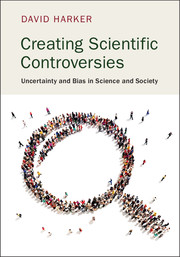Book contents
- Frontmatter
- Dedication
- Contents
- Preface
- Introduction: scientific authority and the created controversy
- Part I Lessons from the Philosophy of Science
- Part II Biases, Arguments and Created Controversies
- Part III Exposing Created Controversies
- 8 Environmental scare: the case of anthropogenic climate change
- 9 Sciences, religion and an intelligently designed controversy?
- 10 Issues of public health: AIDS, autism and GMOs
- Points to remember: Part III
- Concluding remarks
- References
- Index
Points to remember: Part III
from Part III - Exposing Created Controversies
Published online by Cambridge University Press: 05 October 2015
- Frontmatter
- Dedication
- Contents
- Preface
- Introduction: scientific authority and the created controversy
- Part I Lessons from the Philosophy of Science
- Part II Biases, Arguments and Created Controversies
- Part III Exposing Created Controversies
- 8 Environmental scare: the case of anthropogenic climate change
- 9 Sciences, religion and an intelligently designed controversy?
- 10 Issues of public health: AIDS, autism and GMOs
- Points to remember: Part III
- Concluding remarks
- References
- Index
Summary
A created controversy is an issue on which the overwhelming majority of experts are in agreement, but the wider public supposes that the issue is contested and the relevant scientific community evenly divided.
Insofar as the appearance of controversy might lead people to suppose that no-one really has a good grasp on certain issues, we are in danger of ignoring important information.
Ignoring important information threatens the reliability of individual choice and sound social policy.
There is no controversy surrounding the core tenets of anthropogenic climate change.
There is no controversy concerning the age of the Earth, the core assumptions of biological evolution, nor the acute weaknesses of ID.
It is uncontroversial that HIV causes AIDS, and vaccines don't cause autism.
Any impression that any of these issues represent genuine scientific controversies speaks principally to the success of those groups that have created the appearance of controversy.
There is no evidence to suggest that GMOs present a special threat to human health. There are, however, legitimate worries concerning who benefits from the technology and whether it is being judiciously utilized and regulated.
The idea that scientific communities are involved in global conspiracies is implausible.
Our own uncertainty about certain issues is very likely a poor guide to the current state of many scientific issues, and hence a poor reason to reject scientific consensus. The layperson typically has an extremely meagre sense for the sophistication, rigour, scale and variety of modern scientific research programs, the range of methods utilized to gather data, the extraordinary number of very narrow questions being posed, the degree of coherence between distinct methods and analyses, and the depth of understanding that scientists have achieved.
There remain many interesting important questions involving the changing climate and our responses, the relationship between science and religion, biological evolution and related disciplines, issues of public health, the costs and benefits associated with new technologies, and so on. These unresolved and important questions shouldn't detract from what scientific disciplines have achieved.
Scientific methods, conclusions and goals are always legitimate objects of criticism and analysis. However, if we don't work hard to distinguish legitimate objections from weak and politically or ideologically motivated objections then we risk a great deal.
- Type
- Chapter
- Information
- Creating Scientific ControversiesUncertainty and Bias in Science and Society, pp. 246 - 247Publisher: Cambridge University PressPrint publication year: 2015



